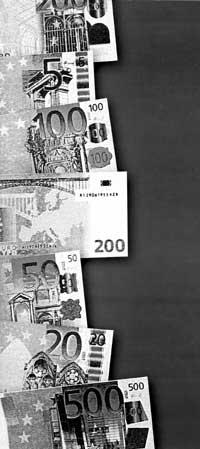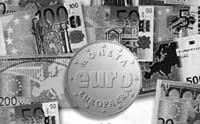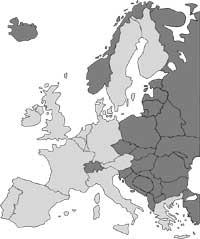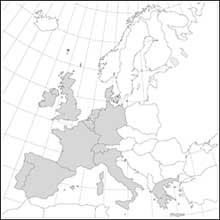Some critical reflections on the euro
1998/09/01 Galartza, Enrike Iturria: Elhuyar aldizkaria

On the theoretical level, the euro does not represent, in summary form, any substantial improvement for the International Monetary System, in a situation as precarious as the current one (remember the recent serious events in East Asia, the Foreign Debts to the Third World or the fluctuations of exchange rates, variables, floating, etc. ). Exchange rates between eleven European currencies will disappear, but what is a real problem, currency and the instability of financial markets, will not be compromised at all. Consequently, the possible fluctuations in the value of the euro, especially with the US dollar and the Japanese yena, are unlimited waiting for that gigantic wave of speculation or flooding… The survival of this threat highlights the shortcomings of current Economic Science.
As far as Economic Policy is concerned, European political powers are applying neoliberalism together with the euro. That is, for all economic activities, the criterion promoted by political power is that of market law. The (neo)freightists think that the economic orientation of society should be determined by the economic game of demand and 'free' supply. and XIX. like some thoughtful of centuries (Hume, Smith, etc. ). An invisible intervention automatically establishes harmony in the market, except in the event that the State or some other similar visible hand participate. Forget therefore the vision of the ancient Keynesians, where the need for redistribution of income was stressed. According to them, market errors should be corrected by the State for the benefit of all, of the whole of society. Hence the welfare state, which is now being undone.
The euro and the RM are not final targets on government agendas. They say that economic growth and the abundance of jobs are the results they want to achieve. How to do it? Freedom giving to the 'sorcerers'. The economic expectations generated by free labor would materialize in the sale of goods, services and financial assets, determining the general economic balance. Many show that the balance in an economy composed of so-called 'free spells' is always a rather complicated mathematical model, smoothly drawn. However, unfortunately, when they take into account bank money or the effects of pollution or corporate monopolies, these models are not able to establish a unique and stable balance.
Unfortunately, for many economists, unemployment is due only to wage excesses. It is the economic expression behind the euro and the BFA. "If they were not the unions and the welfare state (pensions, wages for the unemployed, taxes,…)", they argue, "wages could be lowered, because unemployment is a sign of excess labor that makes the invisible hand reach a balance where voluntary unemployment would not be". Perhaps, if there were enough wage losses, among what is currently on the INEM and ANPE list, it would leave the market to end the unemployment problem.
The fifteen peoples that make up a single market, under the same philosophy, extinguished national 'market barriers' through the Single Act (transition period 1987-1992). The euro will be used as a single currency to develop and facilitate economic freedoms. Financial goods, services and assets can already move freely within the EU, so the remaining economic adjustment corresponds to the labour market and the welfare state. As the National Monetary Policies disappear, the economic capacities of each Government (macro, in the economic orientation of society and micro, in terms of income and expenditure of the financial resources of the Welfare State) will be lower. In addition, the limit that the “Stability and Growth Pact” imposes on public deficits is very low, 3% of the Gross Domestic Product.

It is heard that one cannot live outside the euro, as an indirect argument or… Three of the four countries that have not participated in the EMB have been excluded (Great Britain, Denmark and Sweden). I think all this means you can live outside the euro. The economic policy and macroeconomic criteria required of these countries, and Greece, are similar to those required of others. So the main problem is to meet the liberal criteria and not be in the euro or not.
Finally, in the economic balance generated by the 'invisible hand', it remains to be seen whether a fairer distribution of wealth will be determined. Throughout history, both in the Industrial Revolution and in the current crisis, the difference has been the main result, although most mathematical models confirm the opposite. Without state intervention, the free economic game between private interests does not bring welfare to most of the population, without forgetting the ecological catastrophe and other similar injustices.
Risks taken on the path of the OMR
- Question of credibility: the opinion of international investors on the euro is decisive for the future of the new currency. Therefore, the diplomatic debate surrounding the presidency of the European Central Bank has been described as 'detrimental' by experts. Why? Because Lehendakari's independence from politics is being questioned. For financial markets, the influence of this political dependence is against the hardness of a currency. What you can think of in the speech is that political people always want to spend more public money, they are not afraid of the public deficit or public debt. On the contrary, the real bankers (with few women) are very reliable managers, negative imbalances in the accounts are not at all kind (they rejoice when their income is higher than the erections, but it must be taken into account that before their net returns there is a deficit of someone).
- Since the relations between the Single Monetary Policy and the national Public Budgets will be new, we do not know what will happen between them. Insofar as national economic structures remain different, internal euro convergence or joint policies can have very serious consequences.
Here we must also mention asymmetry. What would happen to exports from the Basque Country, for example, if, as a result of capital incomes in the Frankfurt market, in some weeks of the dollar and the yena, the euro increased by 30 to 50%? Experts
recognize that the interest rates of national Public Debt will be different, to what extent? - In the short term unemployment will remain in Europe, while policies will intensify to limit wage increases. As a result, the areas of urban misery and the number of problems and social needs associated with them will not be diminished (street economic struggles are multiplying throughout Europe, as well as free activities for the poor 'popular soups', 'remains of the coeur').
- The creation of the single currency also raises technical problems:
- The telecommunications IT networks necessary to process the Big Payments (TARGET, SWIFT,…) are a great technical challenge. Since financial intermediaries operate in the current financial markets 24 hours a day on a continuous basis, any breakdowns or computer failure can greatly impact the functioning of the markets.
- National banking systems must manage the payment of the two legal currencies for three years. At best they do not bear the risk of exchange rates, but neither can we forget the uncertainty, the nervousness, that adheres to a new situation.
- Consumers must get used to new price numbers. That it is expensive and cheap we cannot recognize it in euros, at least in the same automatic way that we do in our national currencies. Prices will come in two coins in price tickets of the products for sale from 1999. I think the new desserts, coins and money papers, which will be issued in 2002, will be 'rare' from the beginning, but we will soon know them (apart from some limited cases). In addition, if banks maintain the strategy of recent years, the use of coins and banknotes will be reduced proportionally and electronic cards will be expanded.

Gai honi buruzko eduki gehiago
Elhuyarrek garatutako teknologia





